SQUIRREL_13115965
The Propel Advanced Pro is Giant’s second-tier aero road bike, nestled between the flagship Propel Advanced SL and the entry-level Propel Advanced.
The WorldTour-spec, SL version garnered widespread praise for its combination of aerodynamic efficiency, low weight and high levels of adjustability.
Yet while the Propel Advanced Pro 0 AXS is around half the price of its top-of-the-range sibling, it’s an impressively close match in terms of performance.
Though there are some small spec nitpicks, this is nevertheless one of the best aero road bikes currently available for the money.
Giant Propel Advanced Pro 0 AXS frame
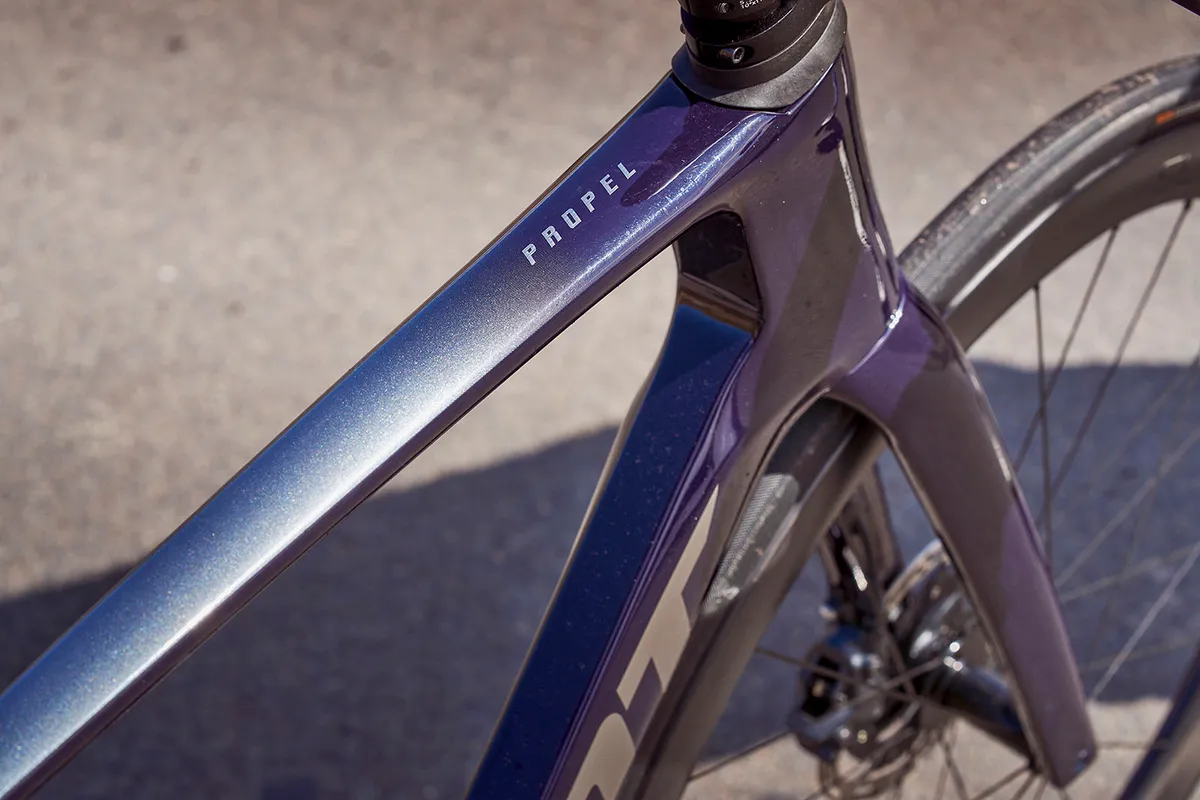
The main difference between the Advanced SL and Advanced Pro models is a tweak to the carbon layup on the frame, with the Advanced Pro using a cheaper and slightly heavier carbon fibre blend (although Giant doesn’t specify how much heavier it is).
The Advanced Pro frame also gets a standard telescoping seatpost, as opposed to the integrated design on the Advanced SL.
Those factors, combined with changes to the spec and groupset, see the Propel Advanced Pro 0 AXS tip the scales at 7.97kg for my size ML (broadly 56cm equivalent) test bike. This includes its neatly integrated composite bottle cages and out-front bike computer mount.
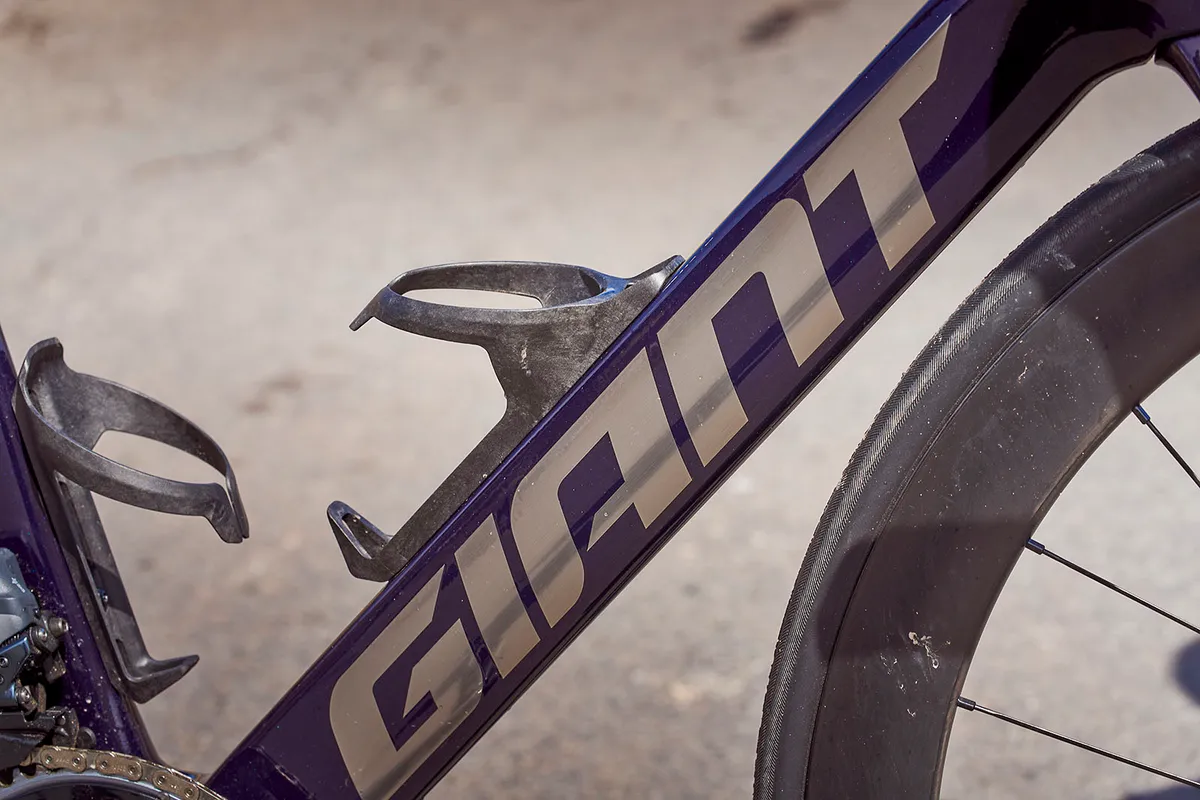
That’s just over a kilo heavier than the £11,999, 6.91kg Propel Advanced SL 0 I tested last year.
Given the Advanced Pro 0 AXS costs £6,399 – 46.7 per cent less than the SL 0 model – though, it’s a compromise many will be more than happy to make.
Compared to the previous Giant Propel, this iteration feels much more of an all-rounder race bike, in the style of the Specialized Tarmac SL7, Merida Reacto or Canyon Aeroad CFR.
It uses truncated aerofoil tube shapes that are smaller and slimmer than on bikes such as the Trek Madone SLR, Cervélo S5 or Cannondale SystemSix. Though it may sacrifice some slipperiness as a result, it manages its weight very effectively for a nominally second-tier carbon frame.
Despite the similarly specced 2023 Cervélo S5 Force eTap AXS costing £3,200 more than the Giant Propel Advanced Pro 0 AXS, for example, it’s 200g heavier (without bottle cages or out-front mount).
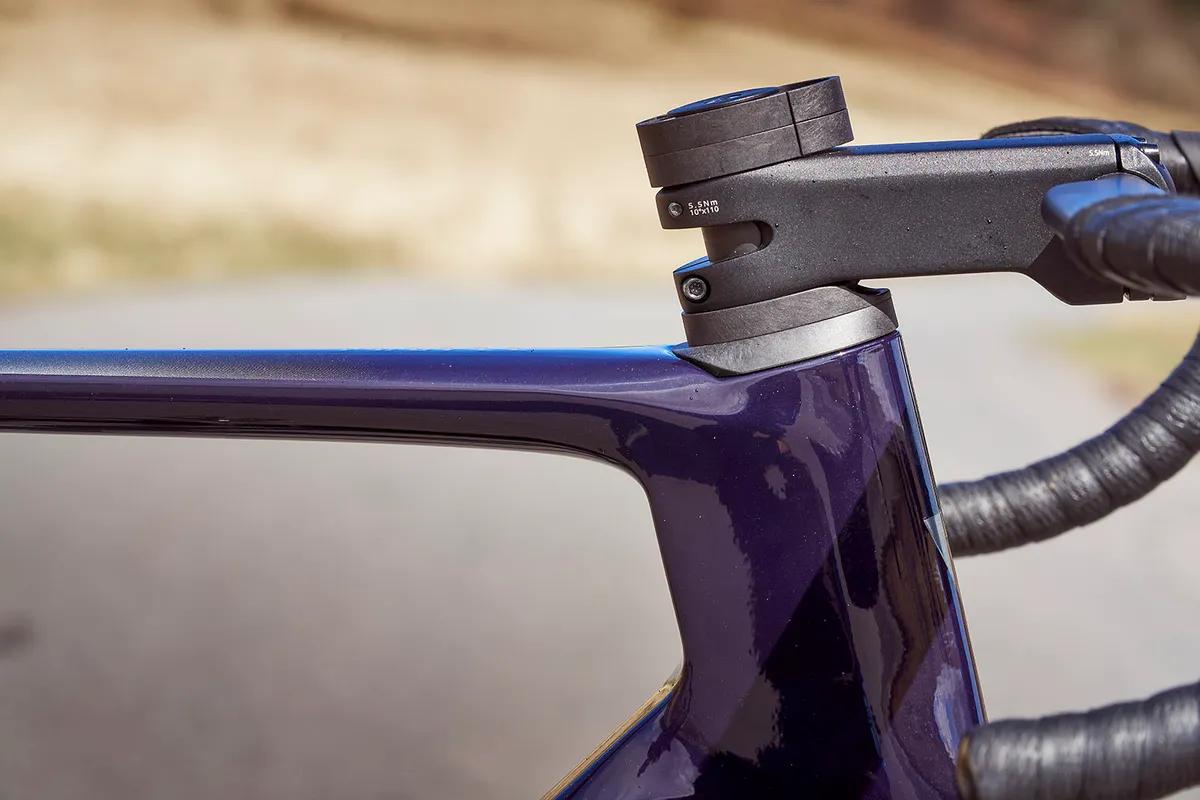
A size 56cm Trek Madone SLR 7 (which has a Shimano Di2 Ultegra R8170 groupset) weighs 7.69kg, 280g less than this Propel. But it’s also £3,800 more expensive and doesn’t include a power meter.
It’s even competitive for value with direct sales brands such as Canyon, whose similarly specced Aeroad CF SLX 8 Disc eTap costs £5,999 and has a claimed weight of 8.06kg.
The Propel has clearance for tyres up to 30mm wide (measured width when inflated).
While that’s likely enough for what most people buying an aero road bike will need, I’d have preferred more if given the choice. The Cervélo S5, for example, can accommodate tyres up to 34mm wide with no notable downsides as a result.
Giant Propel Advanced Pro 0 AXS geometry
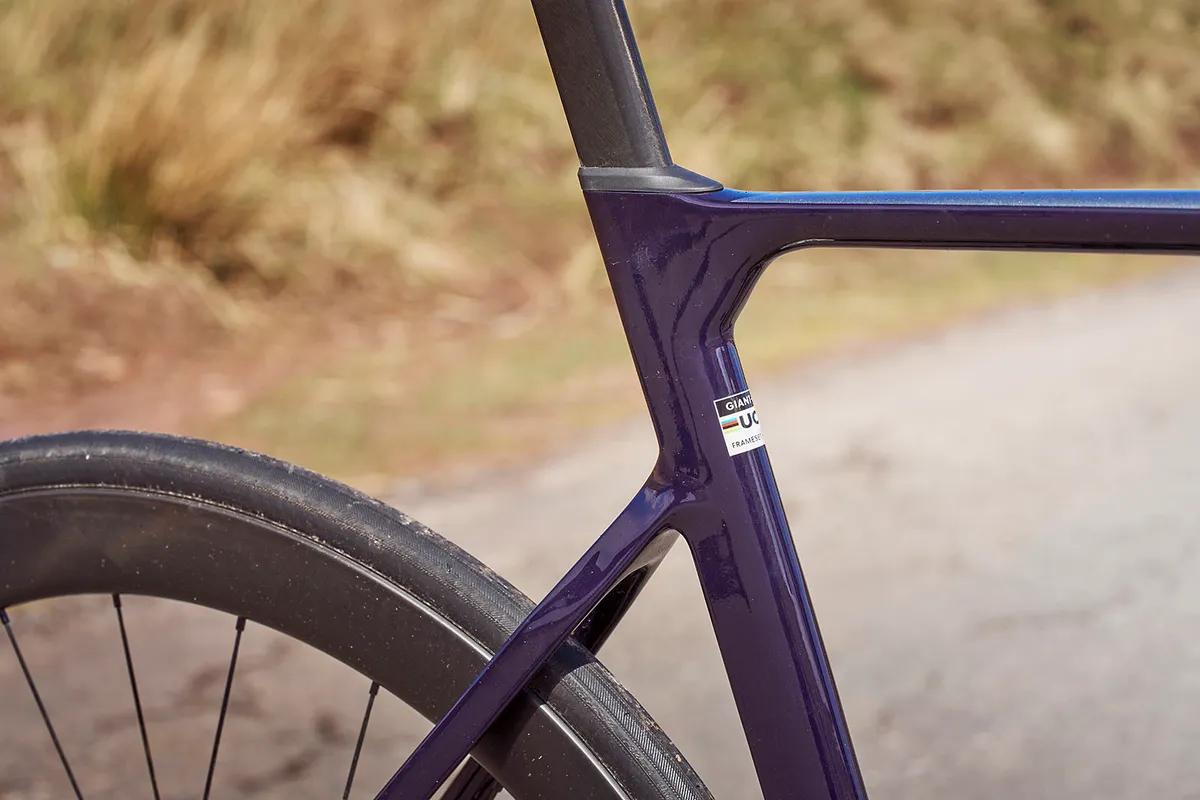
Like the SL version, the geometry of the Propel Advanced Pro mirrors that of the latest Giant TCR.
On my size ML test bike, that translates to 562mm of stack and 393mm of reach, parallel 73-degree head and seat tube angles, and a tight wheelbase of 991mm with 405mm chainstays.
Overall, the Propel (like the TCR), offers a great balance of sharp and reactive handling, while still being predictable and confident at speed.
This is helped by how smooth the Propel is. Big bumps still take their toll, of course, but it does a fine job of shielding you from the high-frequency vibrations that can sap your energy over the course of a long ride.
| | S | M | ML | L | XL |
|---|---|---|---|---|---|
| Seat angle (degrees) | 73.5 | 73 | 73 | 73 | 72 |
| Head angle (degrees) | 72.3 | 73 | 73 | 73 | 73 |
| Chainstay (mm) | 405 | 405 | 405 | 405 | 405 |
| Seat tube (mm) | 500 | 520 | 545 | 575 | 595 |
| Top tube (mm) | 535 | 550 | 565 | 580 | 600 |
| Head tube (mm) | 130 | 145 | 165 | 185 | 200 |
| Fork offset (mm) | 45 | 45 | 45 | 45 | 45 |
| Trail (mm) | 64 | 59.2 | 59.2 | 59.2 | 59.2 |
| Bottom bracket drop (mm) | 68 | 68 | 65 | 65 | 65 |
| Wheelbase (mm) | 977 | 980 | 991 | 1,006 | 1,020 |
| Standover (mm) | 753 | 770 | 794 | 821 | 834 |
| Stack (mm) | 528 | 545 | 562 | 581 | 596 |
| Reach (mm) | 383 | 388 | 393 | 402 | 412 |
| Handlebar width (mm) | 400 | 420 | 420 | 440 | 440 |
| Stem length (mm) | 90 | 100 | 110 | 110 | 120 |
| Crank length (mm) | 170 | 172.5 | 172.5 | 175 | 175 |
Giant Propel Advanced Pro 0 AXS build
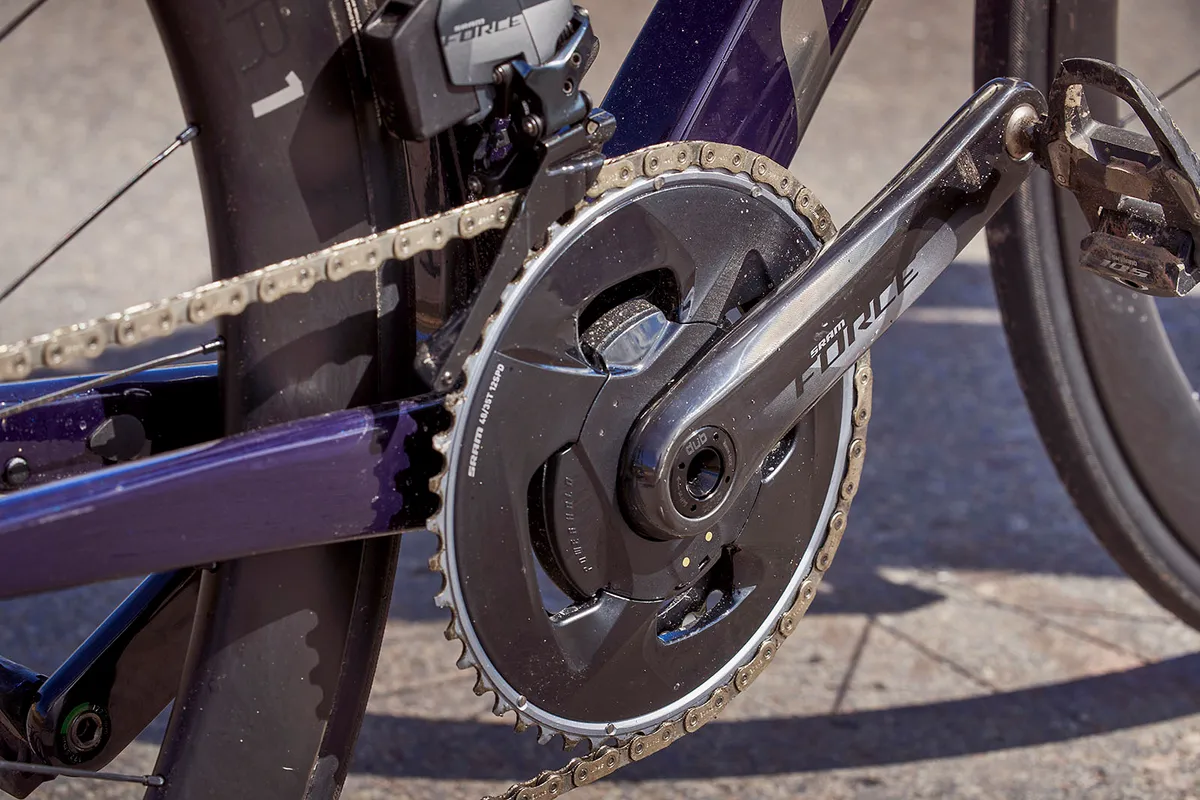
The Propel Advanced Pro frame uses a standard (telescoping) seatpost, and Giant has specced its own proprietary Vector carbon aero seatpost.
It’s identical to the one found on the current Giant TCR Advanced Pro, and it has smart, flippable saddle-clamping hardware to swap the setback between -5 and +15mm.
This is great because most bikes are typically specced with seatposts that have a fixed amount of offset, which limits adjustability. If you want something different to optimise your bike fit, that usually requires splashing out for a replacement.
The seatpost is topped with Giant’s Fleet SL saddle. At 248mm long and 145mm wide, it’s relatively short and wide, along with a generous central cut-out.
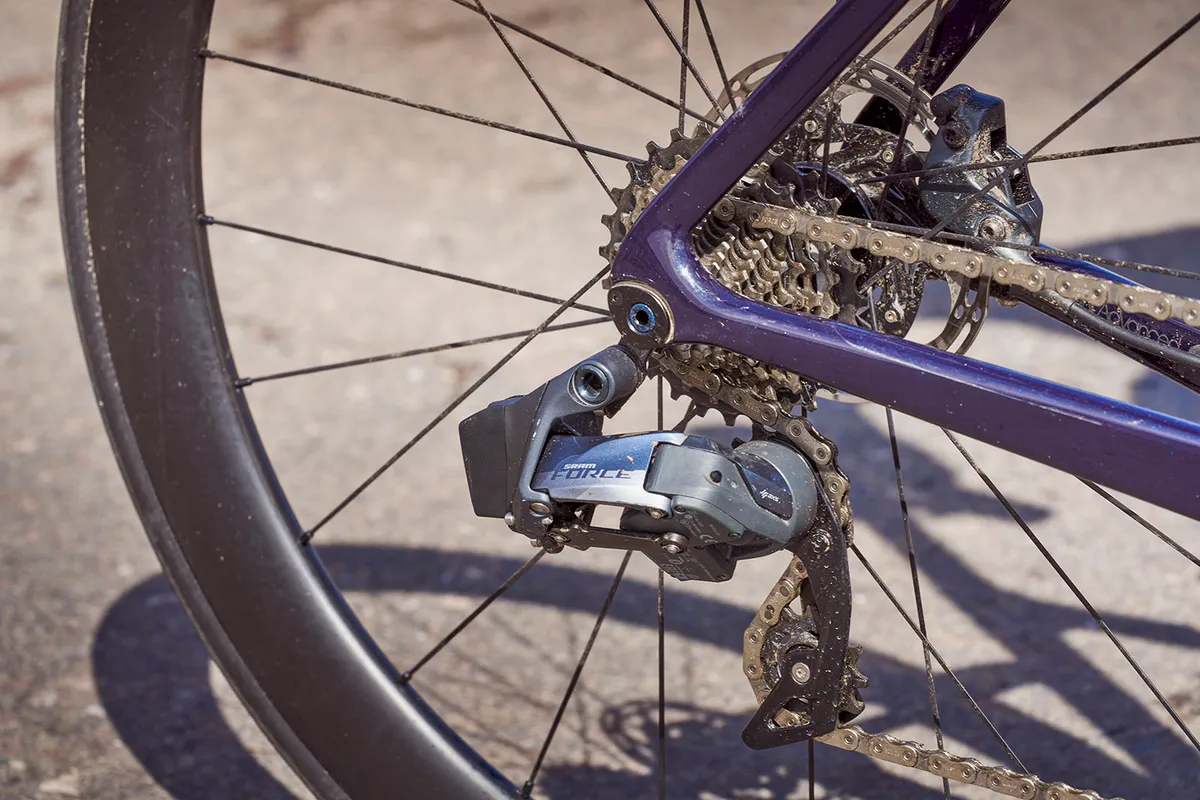
It’s a shape that's similar to many of the best bike saddles currently available, and is a firm favourite of mine.
Up-front is Giant’s Contact SLR Aero carbon handlebar (42cm, centre to centre) and an alloy Giant Contact SL Aero stem (110mm, -10 degrees).
The handlebar has an aerodynamic yet still very comfortable shape, and provides excellent vibration damping. The 42cm width feels a bit wide for an aero race bike, though (narrow handlebars can make your riding position more aerodynamic and offer tangible gains as a result).
Fortunately, the stem uses a round, 31.8mm handlebar clamping area, so should you wish to make a change, finding a compatible option should be relatively easy.
Groupset, wheels and tyres
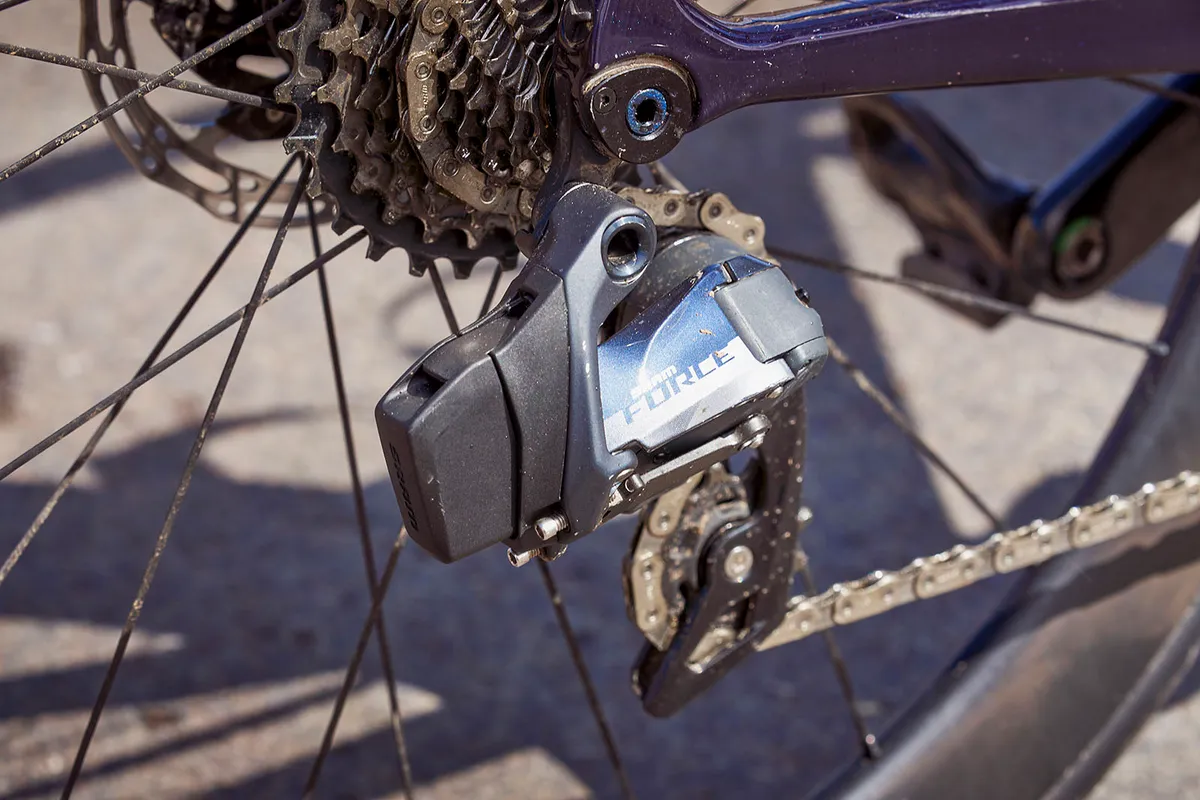
The Giant Propel Advanced Pro 0 AXS is specced with SRAM’s excellent Force eTap AXS groupset.
Up-front, you get 48/35-tooth chainrings matched to a SRAM Force crankset and a Giant Power Halo spider-based power meter.
The Giant Power Halo measures total power (that produced by both legs) to a claimed accuracy of +/- 1.5 per cent.
For those who prefer Shimano gearing, the Advanced Pro 0 Di2 combines a near-identical build with a Shimano Ultegra Di2 R8170 groupset.
At the rear, Giant has specced a 10-28-tooth cassette – the tightest option available from SRAM at the Force tier.
The one-tooth jumps between the seven teeth feel fantastic when powering along on flat or rolling terrain, enabling you to modulate your cadence extremely precisely.
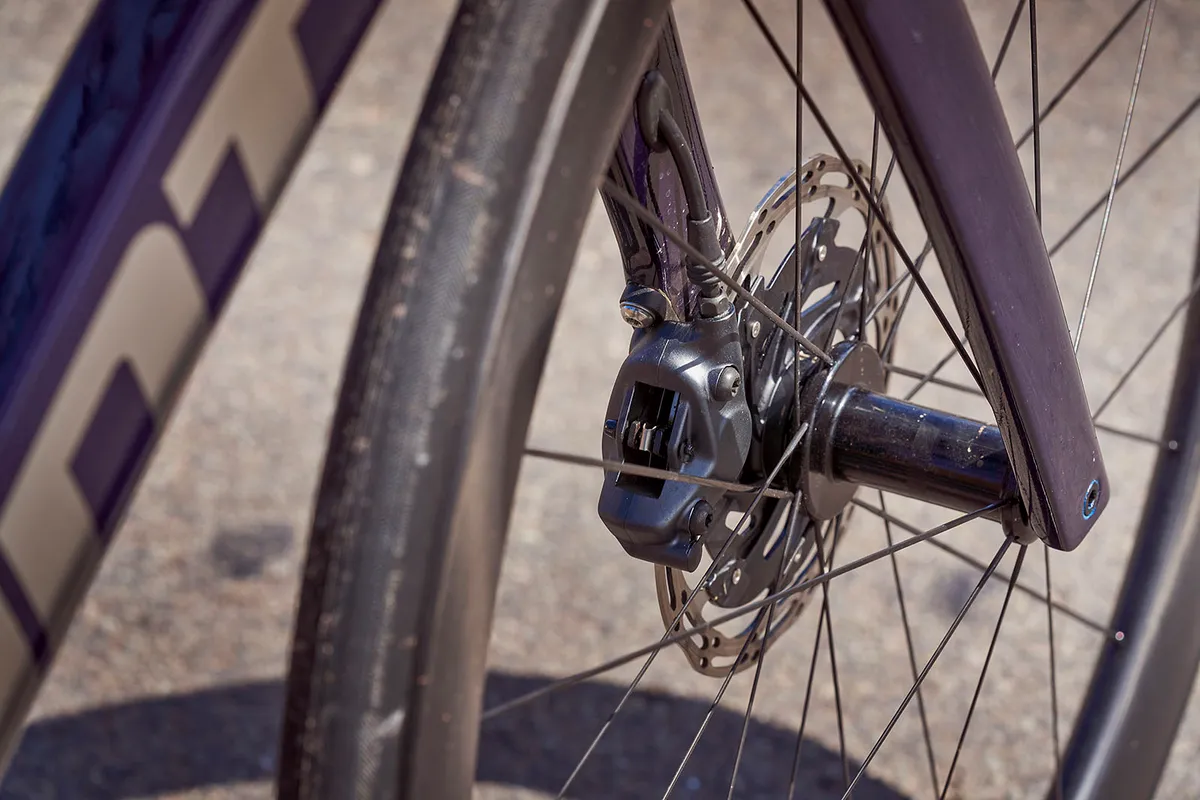
The easiest gear (35x28t) is consequently fairly tall by modern standards, though (how times have changed), and had me grinding, rather than spinning, the pedals every time I hit a steep gradient.
I would need more range if I was riding anywhere mountainous.
Still, replacing the cassette and chain (because you’ll need a longer one to accommodate any larger sprockets), isn’t an arduous task.
The Giant SLR 1 50 Disc wheelset is particularly impressive. It shares its hookless rim profile with the pricier Cadex 50 Ultra Disc wheelset found on Propel Advanced SL builds, with 50mm-deep, 30mm-wide external dimensions.
Internally, the rims measure a healthy 22.4mm, which stretches the 700 x 25c Cadex Race tubeless tyres out to 27.5mm at 75psi / 5.1 bar.
Built with Sapim CX-Ray bladed steel spokes (24 front and rear) around Giant’s own hubs (with steel bearings), the wheels are a fantastic complement to the bike.
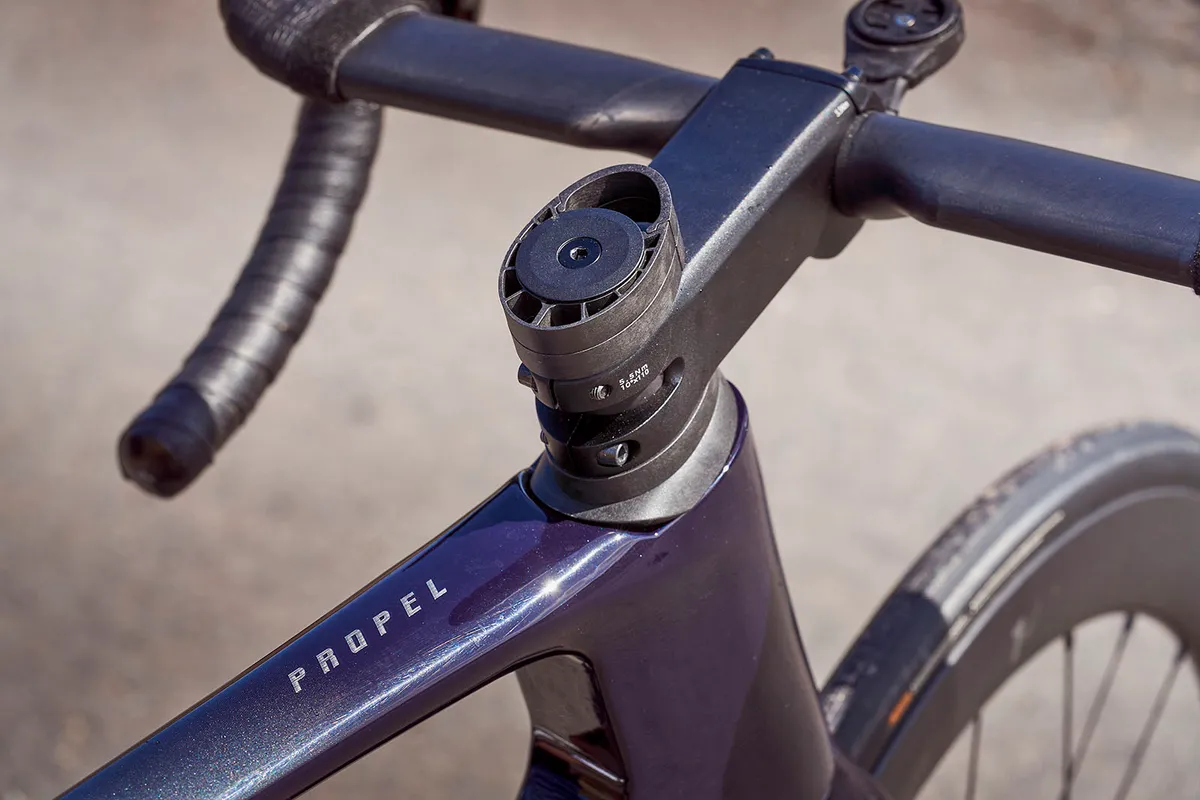
At a claimed weight of 1,518g for the pair, they’re competitive on the scales and feel great on the road, adding a real zing to the bike.
As with the cassette, the relatively narrow tyres also feel slightly old-school.
Ride feel is impressively smooth and grippy considering their width, but I found myself missing the larger contact patch of wider tyres whenever the road conditions deteriorated.
Independent testing by AeroCoach and Bicycle Rolling Resistance also shows the Cadex Race tyres aren’t competitive with the best road bike tyres in terms of rolling resistance.
Again, it’s not a deal breaker because tyres are relatively cheap and easy to change if you want to optimise every last detail, but there is some low hanging fruit to be had here.
Giant Propel Advanced Pro 0 AXS ride impressions
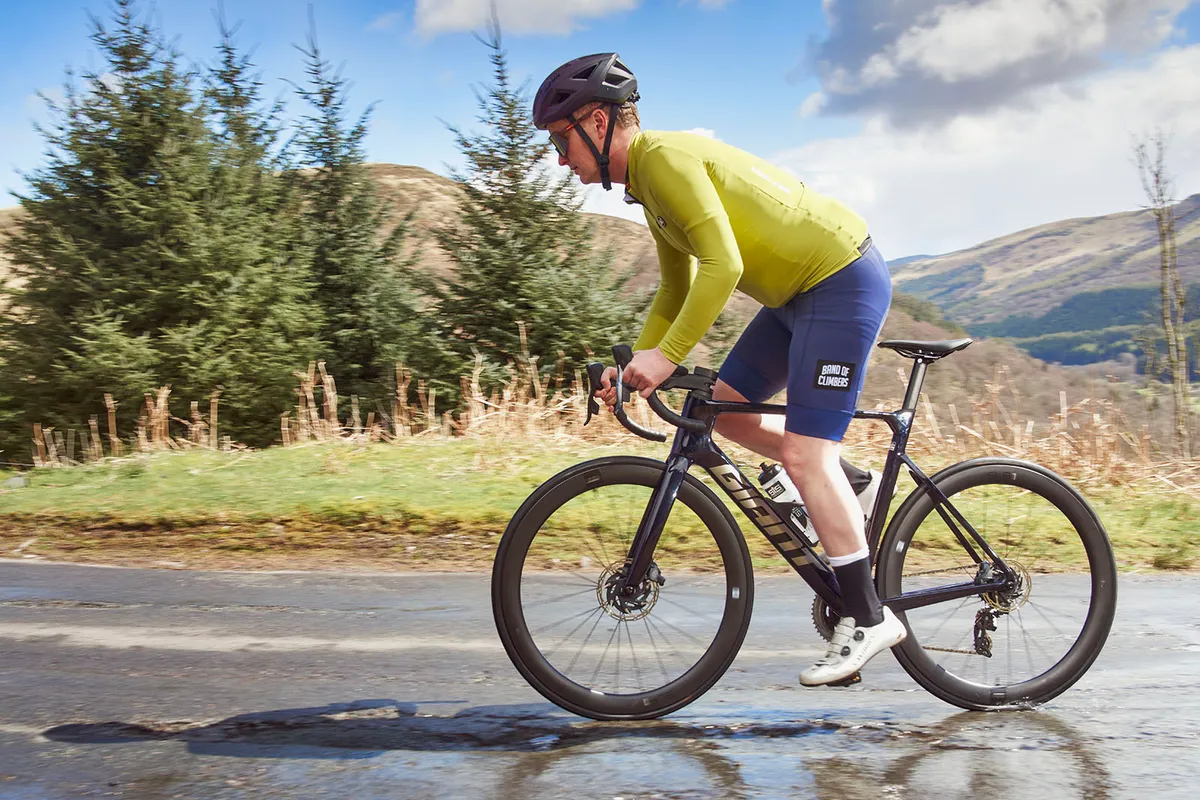
Giant claims the new Propel is 6.21 watts more aerodynamically efficient at 40kph than the previous version (which, it says, should save you 27 seconds over 40km).
Of course, without knowing where the previous Propel sits relative to everything else on the market, I can’t triangulate exactly where the new version is positioned in relation to its competitors.
Nevertheless, out on the road, the Propel Advanced Pro feels competitively fast on practically all types of terrain.
While the increase in overall weight versus the Propel Advanced SL is apparent on the scales, I don’t think it’s overly noticeable while riding.
Of course, basic physics dictates that climbing on a heavier bike will, all else being equal, result in you getting to the top slightly slower. But this bike doesn’t feel perceptibly slower or less keen to accelerate when the road points uphill.
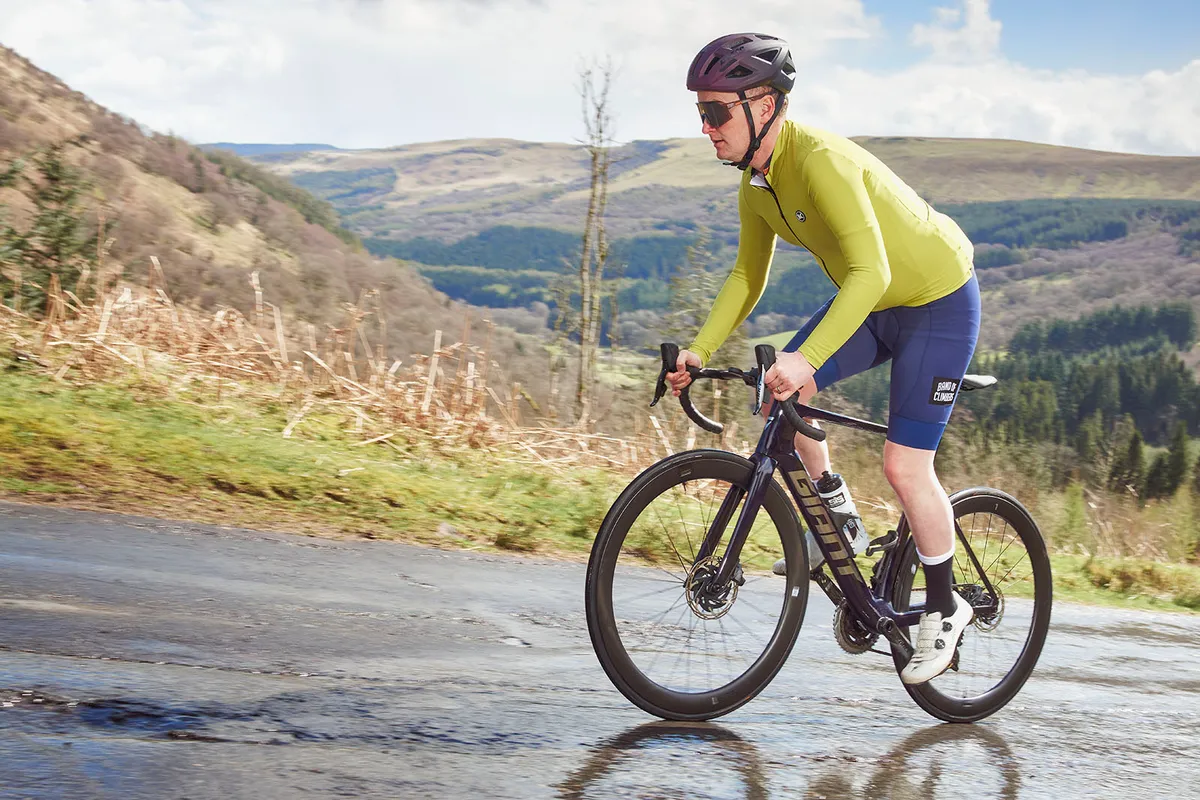
The frameset and wheels have more than enough stiffness to translate my efforts onto the road, and it still maintains that tangible snappiness of a good-quality carbon race bike.
Given its frameset and wheels are less slab-sided than some of the most aggressively aero-optimised bikes out there, it’s also a relatively easy bike to handle on windy days.
Deeper wheels and frame tubes can, in theory, extract greater aerodynamic benefit from sidewinds (in the form of the so-called ‘sailing effect’).
As noted by Ashley Quinlan in his review of the Trek Madone SLR 9 eTap, though, they can also cause more sensitive handling as a result.
So, while I suspect the Propel isn’t the outright fastest aero bike on flat or rolling courses, it is one of the most accessible.
Giant Propel Advanced Pro 0 AXS bottom line
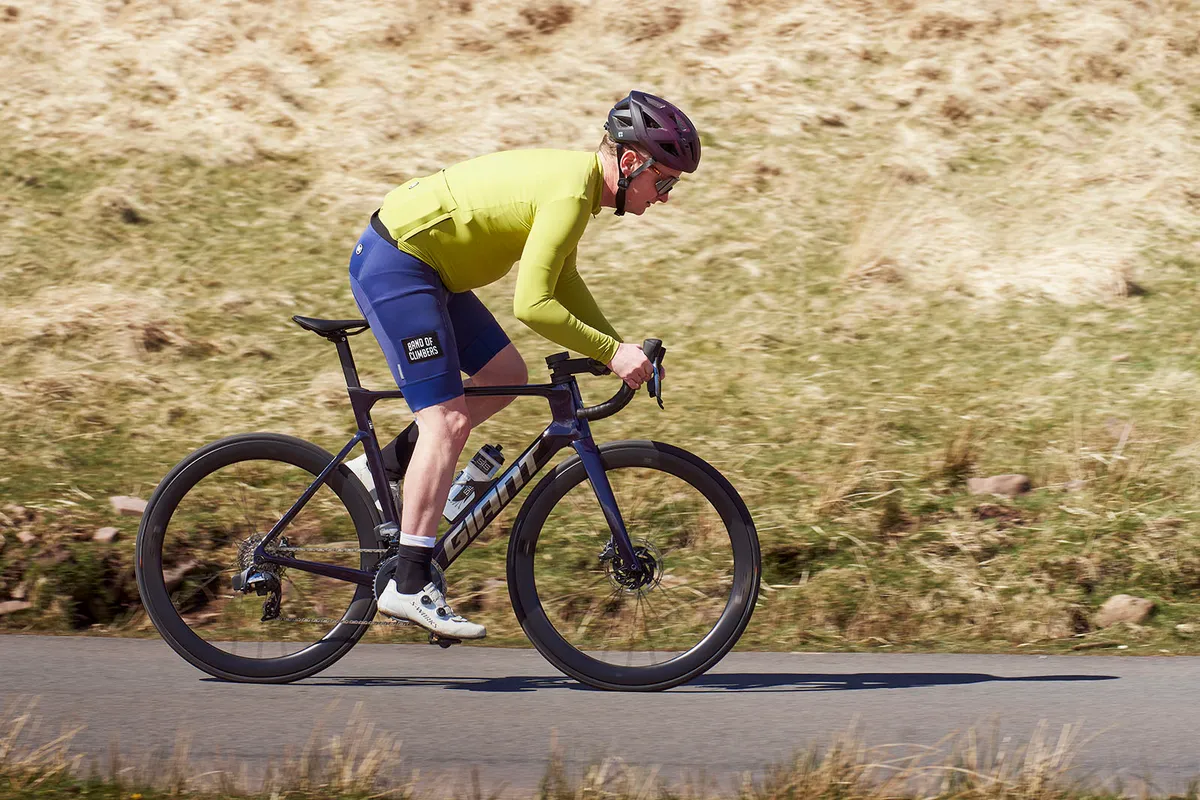
The Propel Advanced Pro 0 AXS delivers almost every bit of the performance of its WorldTour-specced sibling at a price that’s far more palatable.
A few spec nitpicks aside, the Propel Advanced Pro 0 AXS is a race-ready package, and all of the most important parts put in a stellar performance across the board.
So while it’s true that prices for high-end road bikes have risen significantly in recent years, when you can get this much performance at the mid-range, spending any more begins to feel unnecessary.
Aero Road Bike of the Year 2023 | How we tested
If you’re trying to ride faster, then aerodynamic drag is usually your biggest problem.
Previously, though, picking a dedicated aero road bike meant compromising on things such as comfort and practicality. Fortunately, such issues are (largely) problems of the past.
Today’s aero bikes are fast on the flats and no slouches up hills either. Most now include clearance for wide tyres and the best have front ends that don’t require a degree in mechanical engineering to work on.
With that in mind, we put the contenders to the test on the twisty, technical and rolling hills of south Bristol.
As with all road bikes, we considered how easy each bike is to live with, and how easily the stock setup can be adjusted to suit your personal needs and riding style.
Many of the bikes featured in this year’s Aero Road Bike of the Year test are at the upper end of the pricing scale, with premium groupsets and parts showcasing the best contemporary equipment. However, most are also available in cheaper specs if your budget doesn’t stretch as far.
Our Aero Road Bike of the Year contenders
- 3T Strada ICR Force eTap AXS
- Giant Propel Advanced Pro 0 AXS
- Ribble Ultra SL R Enthusiast
- Trek Madone SLR 7
Thanks to…
Thanks to our sponsors, Lazer, FACOM tools and Band Of Climbers for their support in making Bike of the Year happen.
Product
| Brand | giant |
| Price | 8499.00 AUD,6900.00 EUR,6399.00 GBP,8000.00 USD |
| Weight | 7.9700, KILOGRAM (ML) - |
Features
| Fork | Advanced SL-grade composite |
| br_stem | Giant Contact SL Aero |
| br_chain | SRAM Force D1 |
| br_frame | Advanced-grade composite |
| Tyres | Cadex Race, 700 x 25c |
| br_brakes | SRAM Force eTap AXS hydraulic, with SRAM CenterLine XR rotors |
| br_cranks | SRAM Force D1 DUB, 48/35T with Giant Power Halo power meter |
| br_saddle | Giant Fleet SL |
| br_wheels | Giant SLR 1 50 Carbon Disc WheelSystem |
| br_shifter | SRAM Force eTap AXS |
| br_cassette | SRAM Force, 10-28T |
| br_seatpost | Giant Vector composite, -5/+15mm offset |
| br_gripsTape | Giant Stratus Lite 2.0 |
| br_handlebar | Giant Contact SLR Aero |
| br_bottomBracket | SRAM DUB (BB86) |
| br_availableSizes | S, M, ML, L, XL |
| br_rearDerailleur | SRAM Force eTap AXS |
| br_frontDerailleur | SRAM Force eTap AXS |
SQUIRREL_13115965
